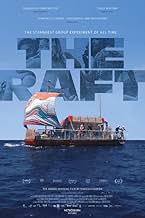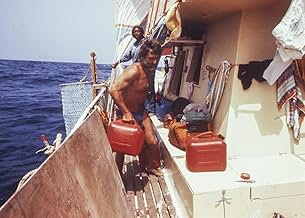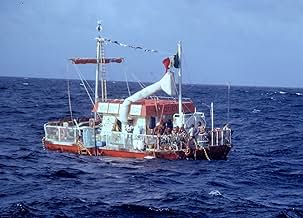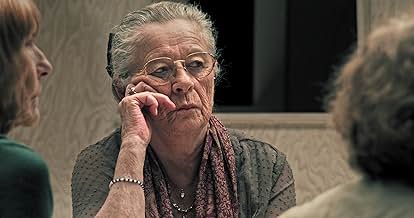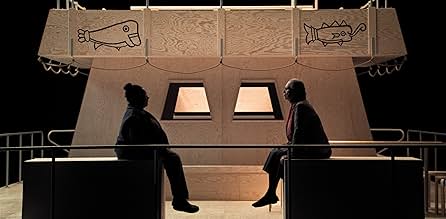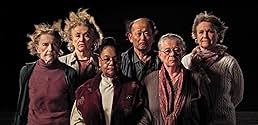NOTE IMDb
6,6/10
1,1 k
MA NOTE
En 1973, cinq hommes et six femmes ont traversé l'Atlantique à la dérive sur un radeau dans le cadre d'une expérience scientifique étudiant la sociologie de la violence, de l'agression et de... Tout lireEn 1973, cinq hommes et six femmes ont traversé l'Atlantique à la dérive sur un radeau dans le cadre d'une expérience scientifique étudiant la sociologie de la violence, de l'agression et de l'attirance sexuelle dans les humains.En 1973, cinq hommes et six femmes ont traversé l'Atlantique à la dérive sur un radeau dans le cadre d'une expérience scientifique étudiant la sociologie de la violence, de l'agression et de l'attirance sexuelle dans les humains.
- Réalisation
- Scénario
- Casting principal
- Récompenses
- 6 victoires et 8 nominations au total
Daniel Giménez Cacho
- Narrator
- (voix)
- …
Fe Seymour
- Self
- (as Fé Seymour)
Santiago Genovés
- Self
- (images d'archives)
Bernardo Bongo
- Self
- (images d'archives)
Charles Anthony
- Self
- (images d'archives)
- (as Charles Antoni)
José María Montero Pérez
- Self
- (images d'archives)
Olaf
- Self - Maria Björnstam's Boyfriend
- (images d'archives)
- (voix)
Avis à la une
There is a fair amount of "stuff" going on here. Arguably the most interesting aspect of this experiment is the manner in which it is conducted - . An aspect that isn't scrutinised in any greater depth.
There are a few, non negotiable, rules that apply to scientific experiments, a number of which were broken in this study:
So... before the experiment began it was, from a scientific point of view a "non-starter".
So... whatever The Raft was - it was not a scientific study and it's findings, whatever they turned out to be, were unlikely to be accepted by any form of "academia".
Then there are the obvious, and hugely relevant, ethical questions. That any higher educational establishment would allow an experiment which, in its definition, aims at placing "real people" in harms way just to study how they would react - is incomprehensible.
There is a documentary to be had out of all this - it's the one covering how it was ever allowed to happen and why nobody ended up in court after its completion.
There are a few, non negotiable, rules that apply to scientific experiments, a number of which were broken in this study:
- A honest researcher doesn't have an agenda to, by means of bias, validitie their hypothesis. A study/experiment is exactly what it implies - a test to see if a theory can be further validated. Trying to influence a study to prove your point is a big no-no.
So... before the experiment began it was, from a scientific point of view a "non-starter".
- A scientific study is most often, and certainly in the case, required to outline what "it is looking for" and "how it is going to be conducted" - before it begins. Changing objective and methodology once the study has commenced is another bi no-no
- The most flagrant breach of conduct is having the "scientist" play an active part in the study - and thus play an active roll in the findings. That is an, enormous, NO-NO.
So... whatever The Raft was - it was not a scientific study and it's findings, whatever they turned out to be, were unlikely to be accepted by any form of "academia".
Then there are the obvious, and hugely relevant, ethical questions. That any higher educational establishment would allow an experiment which, in its definition, aims at placing "real people" in harms way just to study how they would react - is incomprehensible.
There is a documentary to be had out of all this - it's the one covering how it was ever allowed to happen and why nobody ended up in court after its completion.
The premise is fascinating, especially when you get the build up of the first 5-10mins...the problem is...nothing happens.
I'd avoid this sad association with what are usually compelling and insightful Storyville documentaries.
I'd avoid this sad association with what are usually compelling and insightful Storyville documentaries.
I really enjoyed this film. The concept of the "experiment" was interesting to me from an anthropological perspective. I was fascinated getting to know the characters and how their experience progressed. It missed a 10 because I would've been okay with it being a little longer and getting to know more about the dynamics with the characters that past away before the film began.
A lot of rather dubious "scientific" experiments took place in the 1970s; including Santiago Genoves's plan to isolate a small group of people on a raft drifting across the Atlantic. It appears he intended the situation to resemble 'Love Island' with added fisticufffs; in fact, the group got on quite amicably, and the only person to behave in a threatening manner was the supposedly impartial scientist, who was disappointed with the lack of action. This documentary tells the story, through interviews with many of the survivors; where there is a shortage of archive film, director Marcus Lindeen films them on a contemporary replica of the raft. But ultimately, there's not much of a story here and there's certainly not much science; today this would be marketed as a holiday experience for the ultimate traveller without the intellectual pretensions, and no-one would think it worth filming.
An interesting documentary about an experiment to create violence and tension upon a raft that backfired on the Santiago who organised it as it produced only unity and lifelong bonds despite his provocation.
The old footage is fantastic and the interviews with the seven that are still alive are revealing but I would have liked a description of what happened to the men on the boat after the experiment. Absolutely no background to what happened to them and that lets the film down slightly .
In a way this was the forerunner to reality TV as basically this was Big Brother but on a boat . I'd definitely tune in to watch a modern day version of that .
The old footage is fantastic and the interviews with the seven that are still alive are revealing but I would have liked a description of what happened to the men on the boat after the experiment. Absolutely no background to what happened to them and that lets the film down slightly .
In a way this was the forerunner to reality TV as basically this was Big Brother but on a boat . I'd definitely tune in to watch a modern day version of that .
Meilleurs choix
Connectez-vous pour évaluer et suivre la liste de favoris afin de recevoir des recommandations personnalisées
- How long is The Raft?Alimenté par Alexa
Détails
- Date de sortie
- Pays d’origine
- Site officiel
- Langues
- Aussi connu sous le nom de
- Flotten
- Lieux de tournage
- Canary Islands, Canarias, Espagne(departure of the trek)
- Sociétés de production
- Voir plus de crédits d'entreprise sur IMDbPro
Box-office
- Montant brut aux États-Unis et au Canada
- 39 678 $US
- Montant brut mondial
- 47 269 $US
- Durée
- 1h 37min(97 min)
- Couleur
- Mixage
- Rapport de forme
- 2.35 : 1
Contribuer à cette page
Suggérer une modification ou ajouter du contenu manquant


